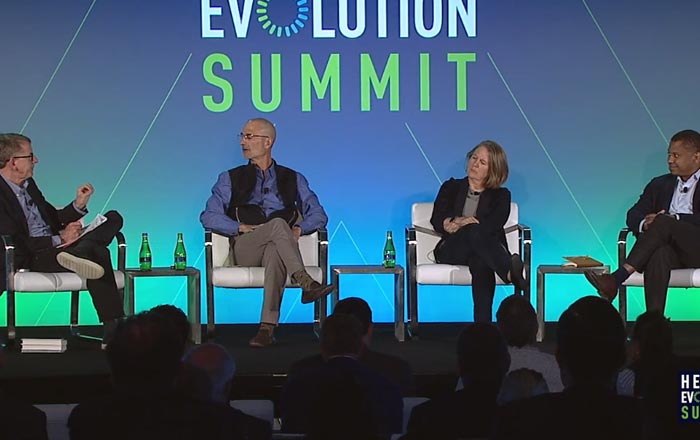What is the payoff from all of this investment in the near term? That question was posed by legendary investor John Doerr (chairman of Kleiner Perkins and a founding investor in Amazon and Google) at the Health Summit 2018 session “AI: A Solution Looking for a Home?”
The consensus of the panelists: applying machine learning analytics to health records will enable successful data-driven interventions.
“Instead of waiting for the event to happen, you want to prevent it from happening in the first place,” said Peter Neupert, Lead Director, Adaptive Biotechnologies Corp.; former VP, Microsoft Health Solutions and Summit Chair.
“If you really can take data from either people or devices and apply that in a large enough scale, then you can be predictive and intervene earlier.”
The types of interventions could include reaching out before a patient becomes sick, intervening while a procedure is taking place or even something as simple as changing a nurse, he said.
The Tractica research predicts that AI will be most used in medical treatment recommendation, patient data processing and medical diagnosis assistance.
Colin Hill, CEO of GNS Healthcare, which provides healthcare data analytics said, “The whole point of this technology is to improve dramatically our ability to better match health interventions, whether it’s drugs, medical procedures, devices, care management interventions to individual patients, to improve outcomes and lower the total cost of care. “
Ultimately, Hill said, the benefit will be seen in identifying treatments that work the first time for cancers and autoimmune diseases, instead of making educated guesses about the best course.
“Why do we have ‘standard of care’ for the hypothetical average patient in 2018? Do we not have the data and the technology to determine ahead of time for a multiple myeloma patient which of the 13 drugs on the market is going to work the first time?” he said.
The work that’s needed to achieve this goal is still formidable and the process will take time. But sticking to current methods will not suddenly become more effective.
“If we have to stand up randomized, controlled trials of a certain size for every discovery, it’s going to take way too long, longer than we want,” Hill said.
GNS Healthcare is working with massive data streams to match therapeutics, procedures, and care management interventions to individuals. It has developed a causal learning and simulation platform, REFS, which is designed to accelerate the discovery of which drugs work for specific individuals.
Last October, GNS reported results from work with the Alliance for Clinical Results in Oncology that identified molecular factors affecting the difference in prognosis and progression between right- and left-sided tumors in colorectal cancers, a situation that had not been understood.
Hills argued that the real transformation will come from shining light on the blind spots.
“There’s so much we just don’t know,” he said. “The doctor prescribes a drug for multiple sclerosis to a given patient and says, ‘If it doesn’t work in six months, come back and we’ll switch you to something else.’ I don’t want to be switched to something else. I want the right answer the first time.”
To reach the point where clinicians will be getting better information about the efficacy of new drugs before they are prescribed, Neupert believes the infrastructure will need to change. The challenge is to find ways to give pharma companies the incentives to change. He believes value-based care can make a difference.
“It will change the incentives, because if I get paid for the 40 percent that don’t respond, my incentive isn’t so great,” he said. “But if I’m not going to get paid for the 40 percent who don’t respond in a value-based care environment” then it becomes financially worthwhile for the life science company toinvest in developing a test for the appropriate biomarker.










